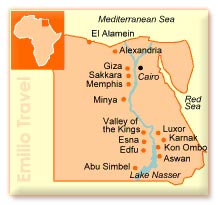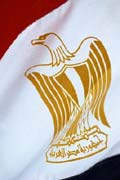 |
|
|
|
Egypt your distinguished
destination
 No country on earth boasts a longer recorded history than does
Egypt, the Eternal "Gift of the Nile" as described by the
Historian Herodotus. A statement as true as today as it has been
through the fifty centuries of Egypt's extraordinary history. No country on earth boasts a longer recorded history than does
Egypt, the Eternal "Gift of the Nile" as described by the
Historian Herodotus. A statement as true as today as it has been
through the fifty centuries of Egypt's extraordinary history.
One of the largest countries in the world, Egypt is a country of
myths and mysteries, the cradle of ancient civilization with
some of the most awesome monuments to be seen in the world.
Known as the "Mother of the world " Egypt has a reason for such
a name for it engages, stimulates, soothes, fascinates and love
simultaneously.
 Egypt occupies the north – eastern part of Africa and covers an
area of 1001450 square kilometers, with a population of 67
million living mainly on the River Nile banks. The very
existence of the country depends on the slender ribbon of the
Nile, the world's second longest river. Egypt occupies the north – eastern part of Africa and covers an
area of 1001450 square kilometers, with a population of 67
million living mainly on the River Nile banks. The very
existence of the country depends on the slender ribbon of the
Nile, the world's second longest river.
Egypt today, although it enjoys a great deal of development, is
also a rare blend of a long past still throbbing with life and a
vibrant, modern present.
Its main resources of foreign currency are: oil, the Suez Canal
tolls, tourism, agriculture and light and heavy industry.
How could you miss the birth place of "KEM" – Egypt named by the
Pharaohs – the oldest civilization in the world? How could you
miss one third of the world's treasures which Luxor has?
Overview |
|
Official name: |
Arab Republic of Egypt (ARE) |
|
Capital City: |
Cairo |
|
Flag: |
Three horizontal stripes, red, white, black, with a gold eagle
on the white stripe |
|
President: |
Mohammed Hosny Mubarak |
|
Languages: |
Arabic (official), English and French widely understood by
educated classes |
|
Major Religions |
Muslim (mostly Sunni) 94% (official estimate), Coptic Christian
and other 6% (official estimate) |
|
Population of Egypt: |
67 million |
|
Population of Cairo: |
17 million |
|
Currency: |
Egyptian pounds |
|
Area: |
1.001.450 sq.Km (386.661 sq.Mi) |
|
Seasons: |
Summer (21 May - 21 September) |
|
|
Autumn (21 September - 21 December) |
|
|
Winter (21 December - 21 March) |
|
|
Spring (21 March – 21 May) |
|
Historical Synopsis
Egypt is probably the world's oldest civilization having emerged
from the Nile Valley around 5000 years ago, historically. The
oldest civilization started with the Pharaonic era which is
divided into three main periods:
The Old Kingdom
Its capital was Menf (Memphis), founded by King Mena, the first
king of I Dynasty, who united Upper and Lower Egypt. One of the
famous kings of that Dynasty is Zoser who built the Sakkara
Pyramid, the first large-scale stone structure in history.
Pharaonic Egypt was at the apex of its civilization at the era
which witnessed the building of the pyramids.
The Middle Kingdom
Its capital was Thebes. A period characterized by an artistic
renaissance, agricultural projects and trade exchange with Bilad
al-Sham and the Sudan
The New Kingdom
The New Kingdom starts with the 18th Dynasty founded by King
Ahmos. Its capital was Thebes, except for the short period, when
King Akhenaton moved his capital to Tel-el-Amarna and lived
there with his wife Nefertiti. Among the eminent rulers of the
New Kingdom is King Ramese II who left a great architectural
patrimony, the most important being the two temples of Abu
Simbel.
After the Pharaonic era came successively the Persian, the
Greek, the Roman and the Byzantine epochs.
The Arab Islamic era
This era starts in 641 when the Arabs entered Egypt, under the
leadership of Amr Ibn el-Aas, and Egypt became a great Islamic
bastion. One of the salient names of this era is that of Salah
Eddin El-Ayyoubi.
In 1798, Napoleon Bonaparte, led his expedition to Egypt, which
brought Egypt in contact with the European civilization for the
first time.
In 1840, Mohammed Ali established his dynasty in Egypt, which it
ruled for over 100 years.
And in 1952, the revolution broke out, put an end to monarchy
and established a republican regime. |
|
|
|
|
|
|
|
|